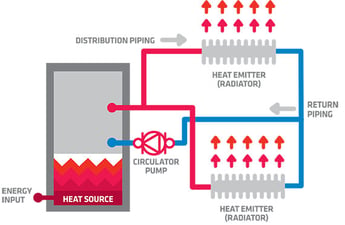
If you own an older home and are a HVAC novice, you may wonder what Hydronic Heating is...…In this article, we are here to let you know!
What is Hydronics?
You're probably wondering: what is hydronics? Hydronics are a method of heat dispersion that uses water to heat your home via a boiler. The term hydronic simply means a way to heat and cool using circulating water as the primary source. Hydronic systems use a series of pipes to distribute water to different portions of the home and deliver comforting heat efficiently.
home via a boiler. The term hydronic simply means a way to heat and cool using circulating water as the primary source. Hydronic systems use a series of pipes to distribute water to different portions of the home and deliver comforting heat efficiently.
 home via a boiler. The term hydronic simply means a way to heat and cool using circulating water as the primary source. Hydronic systems use a series of pipes to distribute water to different portions of the home and deliver comforting heat efficiently.
home via a boiler. The term hydronic simply means a way to heat and cool using circulating water as the primary source. Hydronic systems use a series of pipes to distribute water to different portions of the home and deliver comforting heat efficiently. Hydronic systems operate on a "closed-loop," which means the same water is constantly being recirculated and heated again. This method helps with efficiency as the water in the system typically lasts the lifecycle of the unit. These systems are most notable for being energy efficient, as water is a better conductor than air and limits the heat loss, unlike central air systems.
Types of hydronic heat
Hydronic heat focuses simply on heating the building and the people in it rather than heating the air in the room. It's really an overarching method of heat dispersion, with different types of heat that fall under it. Radiators, baseboards, and in-floor radiant heat are the three systems that use hydronic heating. All of these systems use piping to distribute water heated by the boiler to various parts of the home, and then recirculate the water to be reheated and used again.
radiators
Radiators are common in older homes and use steel or cast iron to emit radiant heat. Runtal Radiators offer a sleek hydronic solution that have a more compact design than older cast iron model radiators.
baseboards
Baseboard hydronic heating units are attached to walls, typically underneath windows. Pipes for baseboard heating can be installed along baseboards or inside walls or floor joists. This type of hydronic heating is a good choice for homes where the area experiences temperatures near or below freezing regularly
radiant flooring
In-floor radiant heat is a little different than the others in that the piping runs underneath the floor to provide heat from the floor up. This option helps with cold spots as heat rises and heats the room itself, not just the air in it. In-floor heating is common in areas of the home where foot traffic is heavy as well as bathrooms.
Hydronic Systems vs. Forced-Air Systems
Efficiency and noise are the two main things that separate a hydronic system from a forced-air system. Forced-air systems use air pushed through ductwork and heated by a furnace to distribute heat. Air is not as effective as water when it comes to conducting heat, causing it to lose heat faster as it travels through the ducts. This leads to cold spots and a waste of energy.
With hydronic systems, water carries heat longer which makes the unit run at a higher efficiency with low heat loss. Better heat conduction also translates to less cold spots, as heat can be dispersed more evenly throughout the home. The silent operation of a hydronic system is also another advantage. Forced-air systems require ductwork for distribution which is costly and noisy. On the other hand, hydronic systems use piping to distribute the water, delivering a more compact and quiet dispersion of heat.
Check out the picture below which displays hydronic radiant floor heating versus traditional forced air heating.
Benefits of a Hydronic Heating System
Hydronic systems provide maximum comfort while saving you money! With a hydronic system you get the most out of your system in regards to energy cost.
Along with cycling the same water for energy conservation and efficiency, hydronic heating also saves on fuel consumption. When the water is returned to the boiler after being used, it only loses a little heat due to its conductive capabilities taking less energy to reheat it for recirculation. Cold spots are also eliminated with hydronics as these systems focus on heating the home itself rather than the air in the space. This helps homes reach temperature quickly and evenly while combating allergens and dust that are cycled through air systems.
These systems are also much quieter than forced air as there is no ductwork involved -- only the boiler. Less noise, energy savings, and cleaner air for your home are just some of the benefits a hydronic system can provide.
Why a hydronic system is best for your home?
Heating systems that use the hydronic method are a great fit for any home. Adaptability, efficiency and quiet technology are all benefits hydronic systems have over the competition. The systems operate on a cleaner level by heating filtered water that's recirculated rather than heating unfiltered air.
Boilers operating within a closed-loop hydronic system tend to have a higher efficiency rating, resulting in money saved with efficient energy usage and longevity. The versatility of hydronic systems also make them work well for any style home, while still maintaining cost effectiveness.
ECI Comfort specializes in installing boilers. If you live in the Delaware Valley/Greater Philadelphia area and would like to find comfort within your home, visit our website or give us a call at 215 - 245 - 3200 to learn more.




